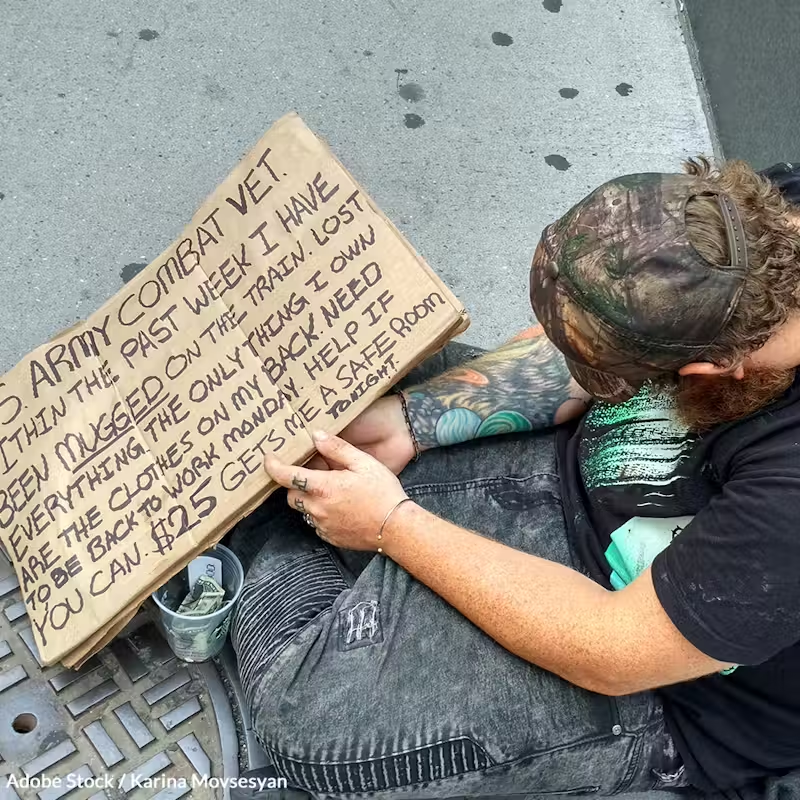Help Veterans Get Back On Their Feet
7,078 signatures toward our 15,000 Goal
Sponsor: The Veterans Site
Demand an increase in funding for the HUD VASH program and help our veterans still on the streets!

On any night in the United States, more than 40,000 veterans are homeless1.
Those veterans account for 11% of all homeless adults in the US. A joint study between Yale University and the VA Connecticut Health Care System in 2015 found that veterans have a higher risk of going homeless than non-veterans, and there are many reasons for that disparity2.
Veterans must navigate the lack of affordable housing and economic hardship like everyone else, but also face challenges brought on by multiple and extended deployments, all which can threaten housing stability3.
Social isolation and lack of support are strongly related to increases in the risk of vets going homeless. Veterans have low marriage and high divorce rates; 1 out of 5 live alone. Without proper social support after discharge, the risk of going homeless is extremely high among vets4.
Often making matters difficult, more than half of veterans experiencing sheltered homelessness have a disability5, as well. VA data maintains that at least a quarter of homeless veterans received diagnoses of chronic medical conditions, more than one in four received a diagnosis of depression, one in eight received a diagnosis of PTSD, about one in five received a diagnosis of alcohol abuse, and about one in five received a diagnosis of drug abuse6.
Veterans returning from deployments in Afghanistan and Iraq are still coming home with greater rates of traumatic brain injury and post-traumatic stress disorder, both of which correlate with homelessness3.
The U.S. Department of Housing and Urban Development and VA Supportive Housing (HUD-VASH) program combines HUD housing vouchers with VA services to help homeless veterans and their families find permanent housing. VA case managers work to connect veterans with support services such as health care, mental health treatment and substance use counseling to help them in their recovery process and with their ability to maintain housing in the community. Among VA homeless continuum of care programs, HUD-VASH enrolls the largest number and largest percentage of veterans who have experienced long-term or repeated homelessness. At the end of FY 2019, there were 90,749 Veterans with active HUD-VASH vouchers and 83,684 vouchers in use7.
The HUD-VASH program was designed to address the needs of the most vulnerable homeless veterans and Congress has appropriated funding for new HUD-VASH vouchers every year since 2008, but the amount has decreased by $35 million in that time8. Sign the petition below and demand an increase in funding for the HUD-VASH program and give all our homeless veterans the support they need.
- Smiljanic Stasha, Policy Advice (27 February 2021), "How Many Veterans Are Homeless in the US 2021."
- Jack Tsai, Rani A. Hoff, Ilan Harpaz-Rotem (2017), "One-Year Incidence and Predictors of Homelessness Among 300,000 U.S. Veterans Seen in Specialty Mental Health Care."
- National Alliance to End Homelessness (November 2019), "Veterans."
- Jack Tsai and Robert A. Rosenheck, US National Library of Medicine, National Institutes of Health (31 July 2015) "Risk Factors for Homelessness Among US Veterans."
- United States Interagency Council on Homelessness (June 2018), "Homelessness in America: Focus on Veterans."
- VA National Center on Homelessness Among Veterans (22 June 2017), "Homeless Evidence And Research Synthesis (HERS) Roundtable Proceedings; Rural Veterans and Homelessness."
- U.S. Department of Veterans Affairs (14 January 2021), "U.S. Department of Housing and Urban Development-VA Supportive Housing (HUD-VASH) Program."
- HUD.GOV (2020), "HUD-VASH Vouchers; Total Number of HUD-VASH Vouchers by PHA 2008-2020."
The Petition:
To the Secretary of Veterans Affairs and Secretary of Housing and Urban Development,
In America, at least 40,000 veterans are homeless each night. The end of veteran homelessness may actually be in sight — right now more than ever is the time to work to make veteran homelessness history.
The U.S. Department of Housing and Urban Development and VA Supportive Housing (HUD-VASH) program was designed to address the needs of the most vulnerable homeless veterans, and it has housed hundreds of thousands. But many more still need help, and funding for this program has steadily decreased since 2008.
Veterans returning from deployments in Afghanistan and Iraq are coming home with greater rates of traumatic brain injury and post-traumatic stress disorder, both of which correlate with homelessness.
I would like to formally thank you for helping veterans out of homelessness through grants in the HUD-VASH program. These brave men and women have fought for their country, and the HUD-VASH program has helped them restore the dignity they deserve.
I also ask that you increase funding for this program. We need to confront veteran homelessness with all the resources we have, and put an end to it now.
Thank you for your concern and attention to America's veterans.
Sincerely,
 Welcome Back! Log In to Continue
Welcome Back! Log In to Continue